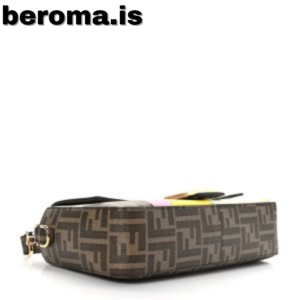 When it comes to high fashion, few brands have the iconic status and unmistakable style of Fendi. The brand, with its long heritage of crafting exquisite luxury goods, has etched its place in the firmament of fashion with an indelible mark. However, beyond the hallowed halls of fashion capitals and the elite circles that can afford such luxuries, a shadow trend lurks – the Fendi bag replica market. In this article, we address the multifaceted discourse around Fendi bag replicas, taking a deep look into the appeal, the consequences, and the ethos of ownership.
When it comes to high fashion, few brands have the iconic status and unmistakable style of Fendi. The brand, with its long heritage of crafting exquisite luxury goods, has etched its place in the firmament of fashion with an indelible mark. However, beyond the hallowed halls of fashion capitals and the elite circles that can afford such luxuries, a shadow trend lurks – the Fendi bag replica market. In this article, we address the multifaceted discourse around Fendi bag replicas, taking a deep look into the appeal, the consequences, and the ethos of ownership.
Understanding Fendi Bag Replicas
A replica in the world of luxury fashion refers to a copy of an original item, often purposely crafted to imitate the design and features of a high-end product. Fendi, renowned for its ‘F’ monogramed bags and ‘baguette’ shoulder bags, has seen its distinctive designs replicated by the thousands. The reasons behind the demand for Fendi bag replicas are varied and complex. They range from the affordability factor to the perception of status and inclusion in the trends set by the elite.
The Legal and Ethical Implications
The luxury fashion industry is fiercely protective of its designs and trademarks, with stringent laws in place to deter counterfeiting. Buyers and sellers of replicas tread on legally precarious ground, risking lawsuits and criminal charges. But the ramifications go beyond the law. There is an ethical quandary at the heart of donning a replica. It’s a question of supporting authentic creativity and artisanal craftsmanship versus contributing to a market that’s often tied to human rights abuses and organized crime.
Quality and Craftsmanship
Discerning between a high-quality Fendi bag replica and a shoddy one can be a challenge. The former may possess a level of detail that approaches the real thing, with fine materials and skilled workmanship. Yet, the distinction lies in the finesse. A genuine Fendi bag undergoes a meticulous process, often handcrafted by artisans with years of training. The materials used are top-tier, the stitching impeccable. It’s not just a bag; it’s a masterclass in leather and luxury.
Impact on the Fashion Industry
The presence of replica Fendi bags has a broad impact on the luxury industry. It can widen the access to designs for those who can’t afford the genuine articles, making fashion a democratic pursuit. However, on the flip side, it dilutes the exclusivity that is a lynchpin of luxury. Brands may find their reputations compromised, and the cachet of their products diminished. The integral question looms – does the presence of replicas harm the industry, or does it simply reflect the shifting values and expectations of modern consumers?
Making an Informed Decision
For those considering purchasing a Fendi bag, the path is twofold. Luckily, there are alternative methods to owning a piece of luxury. Looking into pre-owned or vintage markets is not only more sustainable, it also offers the possibility of owning an authentic item at a more accessible price. Alternatively, choosing a high-quality non-branded bag may offer similar style and longevity without transgressing into the replica market. It is about treating fashion as an investment, not just monetarily, but ethically too.
The Future of Fendi and the Role of Replicas
The lure of owning a Fendi, a tangible recognition of taste and affluence, is undeniable. Yet, the replica market beckons with affordability and convenience. The conversations about replicas and their role in fashion are far from over; they need to be nuanced and evolving. Brands like Fendi must grapple with the challenge of catering to a wide audience while still maintaining their exclusive appeal. Readers are encouraged to be part of this dialog, to voice their opinions, and to make conscientious choices in their fashion journeys.
In a world where the allure of luxury is balanced precariously against the vise-grip of our ethically informed consciences, the choice is ultimately yours. The future of fashion trends and the luxury industry rests, in part, in the decisions you make as a consumer. Whether you opt for a replica, an authentic piece, or an alternative route, each choice carries with it a narrative. It’s a narrative that weaves into the larger tapestry of the fashion world, where the threads of value, quality, and ethics interlace in complex patterns.
Fashion, especially luxury fashion, is an art form. It is expression, creativity, and history woven into the very fabric we wear. Replicas, in their way, engage with that art. They echo the sentiment of the original, if muted by the absence of legitimacy, craft, and story. In exploring this topic, what becomes clear is that the discussion around Fendi bag replicas is not binary. The tapestry of fashion – the good, the bad, and the controversial – is richer for the threads it sources, whether in salons of Paris or in the bustling markets that trade in imitations. It’s a conversation that has to be as nuanced as the products themselves, as we all strive to find our place within this intricate, evolving art form.